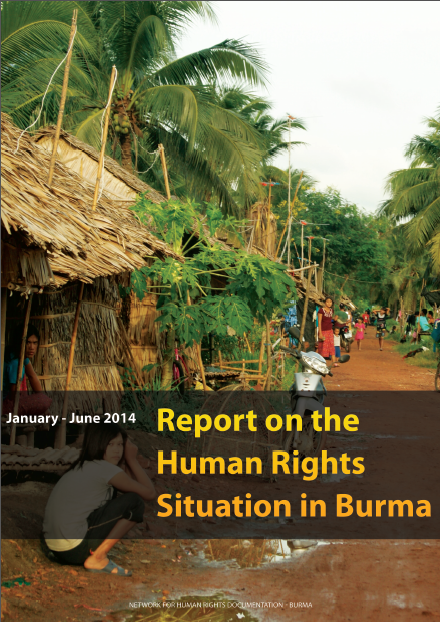Posts Tagged ‘Journalists’ (41 found)
Myanmar/Burma: Sustained EU Engagement at UN Critical to Support Human Rights Reforms
Amnesty International, FIDH (the International Federation for Human Rights), and its member organization, the Alternative ASEAN Network on Burma (ALTSEAN-Burma) today call on the European Union (EU) and its member states to ensure continued international engagement on the human rights situation in Burma by again introducing a resolution on the country at the upcoming United Nations General Assembly (UNGA) in October 2014. A failure to retain a robust UNGA resolution on Burma would endanger progress on human rights, which has increasingly come under threat this year […]
• • •January – June 2014: Report on the Human Rights Situation on Burma
The Network for Human Right Documentation-Burma (ND-Burma) is an organization that documents and reports human rights violations taking place throughout Burma. We are a watch-dog for human rights violations and are continually monitoring the human rights situation in Burma.
This report covers the first period of 2014 and focuses on 103 documented cases of human rights violations in Burma from January-June 2014. There are many serious human rights violations addressed and highlighted in this report, including: torture, extra-judicial killing, illegal arrests and detention, arbitrary taxation, property crimes, forced labor, human trafficking, forced displacement and rape.
Even though President U Thein Sein promised to release all political prisoners by the end of 2013, there are still many political prisoners in Burma, including new detainees in 2014. Many human right defenders and activists have been arrested under the Unlawful Association Act of 1908, Section 5 (e) and 5 (j) of the Emergency Provisions Act, and Section (18) of the Right to Peaceful Assembly and Peaceful Procession Act. For example, U Win Cho and U Nay Myo Zin were arrested under Section (18) for protesting the confiscation of land in Kyauk Ta Dar Township, Yangon. Moreover, innocent Kachin IDPs were arrested under Section (17) of the Unlawful Association Act for suspected contact with ethnic armed groups. These actions reinforce the fact that the government in Burma is still willing to use oppressive and unjust laws against the Burmese people […]
• • •Four Journalists Now “Only” Facing Two-year Sentences on Reduced Charges
A court in the southern Rangoon suburb of Padeban announced yesterday that the five Bi Mon Te Nay journalists still being held will no longer face charges under the draconian Emergency Act that carry a possible 14-year sentence, but will still be tried on lesser penal code charges […]
• • •Will the President of Myanmar Keep His Promise?
The veneer of progress is wearing thin in Myanmar. A year ago, the President of Myanmar, Thein Sein, promised to release all prisoners of conscience. Earlier this year, to mark Myanmar’s Independence Day, the President ordered the release of thousands of prisoners. Now one year on from the promise to release all prisoners of conscience, the promise remains unfulfilled. Even more troubling is the fact that the government is arresting more prisoners of conscience […]
• • •Statement of the Special Rapporteur on the Situation of Human Rights in Myanmar
Introduction:
Good evening and thank you all for coming today. I have just concluded my first official ten- day mission as Special Rapporteur on the situation of human rights in Myanmar. The objective of my visit was to assess the human rights situation in Myanmar through a better understanding of the realities on the ground. Accordingly, I sought to engage constructively with a broad spectrum of stakeholders, including Government officials, political, religious and community leaders, civil society representatives, as well as victims of human rights violations and members of the international community. I was pleased to have had a frank and open exchange of views on a range of matters related to my mandate. And I am grateful that many were so forthcoming in their views on sensitive issues […]
• • •Four Detained Newspaper Journalists Appear in Court on Emergency Provisions Act Charges
Four of the seven journalists with the weekly Bi Mon Te Nay who were arrested more than two weeks ago on charges of publishing false information and threatening state security were brought before a court in the southern Rangoon suburb of Padeban on 22 July for a preliminary hearing […]
• • •BURMA/MYANMAR: Immediate Need for Fair Trial and Remedies for Free Speech
During the three year period of new Myanmar Government, new political reforms have been taking place. The authorities stopped censoring the media in June 2012 and also allowed private news media groups to print newspapers in April 2013. As people in Burma only had state owned newspapers for the previous decade, elderly journalists and society of media appreciated this with welcoming heart. Today, news outlets can freely debate political issues and human rights abuse cases that they could not discuss during the military dictatorship, not because they were afraid of but because they could not get published. Even after they stopped censorship, prosecution of the government started to bring journalists in accordance with applicable laws […]
• • •Burma: Increased Number of Political Prisoners Calls for Renewed International Pressure
Without genuine legislative reform and sustained international pressure, the number of Burma’s political prisoners is set to steadily rise, FIDH and its member organization, the Alternative ASEAN Network on Burma (ALTSEAN-Burma), warned today […]
• • •Myanmar: One Year on, President’s Promise to Release All Prisoners of Conscience Remains Unfulfilled
One year after President Thein Sein pledged to clear Myanmar’s jails of prisoners of conscience – a pledge which to date remains unfulfilled – Amnesty International calls on the Myanmar authorities to immediately and unconditionally release all those who have been imprisoned simply for the peaceful exercise of their human rights […]
• • •











 All posts
All posts